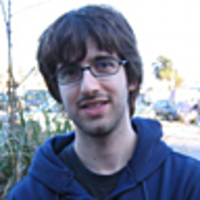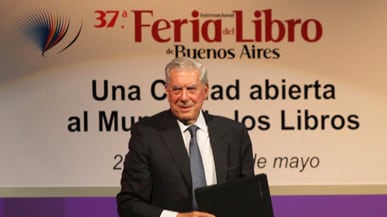Every April for the last 36 years, writers and readers have descended upon Buenos Aires like autumn leaves to the city streets for the Spanish-speaking world's largest general interest literary event. The Buenos Aires International Book Fair (or La Feria Internacional del Libro de Buenos Aires) has outlived military dictatorship, hyperinflation, economic collapse, and a shoddy film adaptation of Argentine bestseller The Oxford Murders; it welcomed an unprecedented 1.2 million attendees last year. Its current incarnation—which opened April 20 and closes May 9—promises thousands of lectures, readings, exhibitions, and talks, and even a bit of cultural turmoil in the form of recent Nobel winner Mario Vargas Llosa, who has been tapped (against the protest of the country's left-wing) to inaugurate the event.

Earlier this year, when organizers announced that Vargas Llosa would serve as the event's official "opening act," it was proffered as emblematic of the Book Fair's elevated stature—in the past decade, the event has grown from one of regional importance to a highlight of an expanded international circuit of similar events. In 2000, it moved from its original home in a City Municipal Center to a much larger space used for agricultural expositions. This year it will swell once again—by 8,000 square meters—meaning it will dedicate nearly 500,000 square feet of exhibition space to the written (and printed) word.
In line with this growth, the Peruvian author is the first Nobel laureate invited to inaugurate the fair. But many Argentines have bristled at the choice of a writer who is seen as anything but a fan of the South American nation. Vargas Llosa is one of a number of Latin American writers and intellectuals who began their careers on the left but have since veered to the right. But it's not just his political posture that has much of the Argentine literati upset: In 2010, speaking to a regional newspaper, the esteemed novelist called the country "indecipherable," "chaotic," and "impoverished" and chastised President Cristina Fernández de Kirchner for her "populist" leadership of the country. In other words, it's personal.
Cabinet Chief Aníbal Fernández has gone on record calling the Nobel laureate "an enemy of Argentina" and Horacio González, director of the Argentine National Library, published an open letter asking that Vargas Llosa be uninvited, labeling his involvement in the Book Fair (perhaps ironically) a challenge to "freedom of expression" in the country. But despite suspicions that the invitation is a blatant promotion of right-wing politics at a time of political precariousness (Kirchner is up for reelection in October), the president herself asked González to rescind his protest. He has, though many still question the appropriateness of Vargas Llosa inaugurating one of Argentina's most high profile homegrown cultural events.
The Book Fair, however, has not been immune to controversy in the past. In 2010, during a presentation of her memoirs Mi Verdad ( My Truth), dissident Cuban doctor Hilda Molina was verbally and physically assaulted by a group calling itself the "Friends of Cuba." At the time, organizers stressed that such a thing was unprecedented; aligning the attack on Molina with the critique aimed at Vargas Llosa (as some in the Argentine media have done) surely threatens to overshadow the kind of international exchange and openness that the Book Fair strives to enact.
Since the Argentine Society of Authors (SADE) hosted the first International Book Fair in 1975, it has stressed the importance of bringing worldwide exposure to the South American literary scene, offering readers the chance to sample stories from around the globe and book sellers the opportunity to display the richness of Argentine writing. Over the years, it has welcomed guest authors and literary presenters from across 50 nations, including many with literary traditions not in Spanish (Paul Auster, Annie Proulx, Ray Bradbury, and Susan Sontag have all attended in the past, to name just a few Americans).
In a city that fostered the talents of 20-century masters Jorge Luis Borges and Julio Cortázar and that is still capital of Latin America's largest book-buying culture, a little cringing over an inauguration surely won't derail the popular event. Over 1,300 presentations and 1,300 cultural activities are slated to take place, representing a healthy mix of educational, literary, academic, and popular offerings—from a "Forum on the Teaching of Science and Technology" to a "Literary Marathon," where readers are invited to tour the city with authors and actors who will read from the city's masters on the very ground where their stories are set.
In line with the Book Fair's 2011 theme—"A City Open to the World of Books"—more than 40 authors from outside Argentine letters will give readings and book signings (including Ghanean storyteller Inno Sorsy and Turkish poet Ahmet Kot) over the 20 days of the fair. Representatives from UNESCO will present the book-loving city with its own stamp of approval: naming it the "2011 World Book Capital City" in a ceremony on April 23, an honor that recognizes Buenos Aires' continued work to promote and foster its local literary culture. An honor that the million plus in attendance (excluding perhaps Vargas Llosa) will certainly not protest.
Joey Rubin is the books editor at The Argentina Independent. His essays and reviews have appeared in The San Fransisco Chronicle and Nerve.com and his fiction in the anthology Promised Lands.






